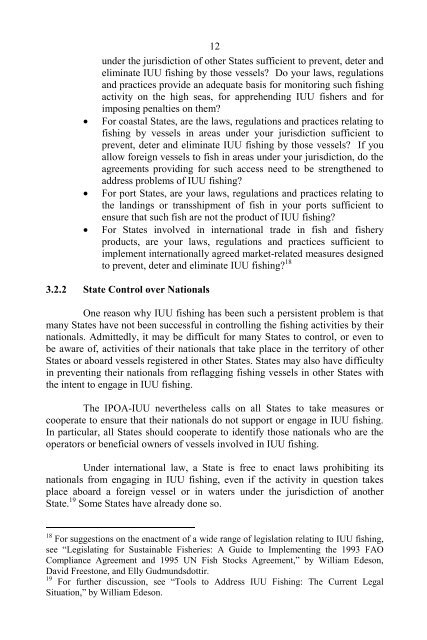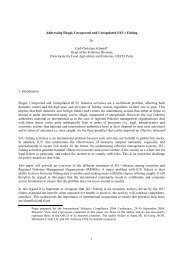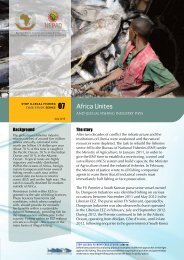11the vessels rarely if ever visit the territory <strong>of</strong> the flag State, and the fish harvestedby the vessels are not sold in (or even transshipped through) the flag State. Evenmore importantly, the flag State has neither the ability nor the apparent will tomonitor the fishing activities <strong>of</strong> the vessels or to impose penalties on them for<strong>IUU</strong> fishing. Indeed, the vessels register in such flag States precisely to avoidsuch control.In sum, <strong>IUU</strong> fishing on the high seas constitutes, first and foremost, afailure on the part <strong>of</strong> flag States to abide by responsibilities recognized by theinternational community and reflected in relevant international instruments. The<strong>IPOA</strong>-<strong>IUU</strong> contains a number <strong>of</strong> tools, discussed in Section 4 <strong>of</strong> theseguidelines, to help willing flag States fulfil these responsibilities. Those flagStates that are unwilling to use these tools could also help prevent, deter andeliminate <strong>IUU</strong> fishing by removing from their registries those fishing vesselswhose activities they cannot control. Indeed, some States have begun to deletefishing vessels from their registers in response to requests from other States andRFMOs to end <strong>IUU</strong> fishing that their vessels had been conducting.3.2 National Laws, Regulations and Practices3.2.1 Review <strong>of</strong> Pertinent Laws, Regulations and PracticesAt an early stage in the implementation <strong>of</strong> the <strong>IPOA</strong>-<strong>IUU</strong>, each Stateshould undertake a thorough review <strong>of</strong> its national laws, regulations andpractices relating to <strong>IUU</strong> fishing. 17 Such a review could be done in connectionwith the development or revision <strong>of</strong> fishery management plans, as are called forin the Code <strong>of</strong> Conduct. The principal goal <strong>of</strong> the review should be to rationalizeand strengthen the legal regime and to make possible the use <strong>of</strong> all relevant toolsin the <strong>IPOA</strong>-<strong>IUU</strong> "toolbox". The review should consider such questions as:For all States, is any additional legislative or regulatory authoritynecessary or desirable to implement the <strong>IPOA</strong>?Are existing penalties for <strong>IUU</strong> fishing <strong>of</strong> sufficient severity toprevent, deter and eliminate such fishing by vessels flying your flagand/or operating in areas under your jurisdiction?For all States, does your domestic law give effect to obligationsyou have assumed under international law, including through yourparticipation in RFMOs?For flag States, are the laws, regulations and practices relating t<strong>of</strong>ishing by vessels flying your flag on the high seas and in areas17 Such a review would not necessarily entail the enactment <strong>of</strong> legislative changes. Buteven in cases where legislative changes are necessary, States should attempt to implementas many aspects <strong>of</strong> the <strong>IPOA</strong>-<strong>IUU</strong> as possible even prior to the culmination <strong>of</strong> legislativeaction, which can <strong>of</strong>ten involve lengthy delays.
12under the jurisdiction <strong>of</strong> other States sufficient to prevent, deter andeliminate <strong>IUU</strong> fishing by those vessels? Do your laws, regulationsand practices provide an adequate basis for monitoring such fishingactivity on the high seas, for apprehending <strong>IUU</strong> fishers and forimposing penalties on them?For coastal States, are the laws, regulations and practices relating t<strong>of</strong>ishing by vessels in areas under your jurisdiction sufficient toprevent, deter and eliminate <strong>IUU</strong> fishing by those vessels? If youallow foreign vessels to fish in areas under your jurisdiction, do theagreements providing for such access need to be strengthened toaddress problems <strong>of</strong> <strong>IUU</strong> fishing?For port States, are your laws, regulations and practices relating tothe landings or transshipment <strong>of</strong> fish in your ports sufficient toensure that such fish are not the product <strong>of</strong> <strong>IUU</strong> fishing?For States involved in international trade in fish and fisheryproducts, are your laws, regulations and practices sufficient toimplement internationally agreed market-related measures designedto prevent, deter and eliminate <strong>IUU</strong> fishing? 183.2.2 State Control over NationalsOne reason why <strong>IUU</strong> fishing has been such a persistent problem is thatmany States have not been successful in controlling the fishing activities by theirnationals. Admittedly, it may be difficult for many States to control, or even tobe aware <strong>of</strong>, activities <strong>of</strong> their nationals that take place in the territory <strong>of</strong> otherStates or aboard vessels registered in other States. States may also have difficultyin preventing their nationals from reflagging fishing vessels in other States withthe intent to engage in <strong>IUU</strong> fishing.The <strong>IPOA</strong>-<strong>IUU</strong> nevertheless calls on all States to take measures orcooperate to ensure that their nationals do not support or engage in <strong>IUU</strong> fishing.In particular, all States should cooperate to identify those nationals who are theoperators or beneficial owners <strong>of</strong> vessels involved in <strong>IUU</strong> fishing.Under international law, a State is free to enact laws prohibiting itsnationals from engaging in <strong>IUU</strong> fishing, even if the activity in question takesplace aboard a foreign vessel or in waters under the jurisdiction <strong>of</strong> anotherState. 19 Some States have already done so.18 For suggestions on the enactment <strong>of</strong> a wide range <strong>of</strong> legislation relating to <strong>IUU</strong> fishing,see “Legislating for Sustainable Fisheries: A Guide to Implementing the 1993 FAOCompliance Agreement and 1995 UN Fish Stocks Agreement,” by William Edeson,David Freestone, and Elly Gudmundsdottir.19 For further discussion, see “Tools to Address <strong>IUU</strong> Fishing: The Current LegalSituation,” by William Edeson.
- Page 4 and 5: iiiPREPARATION OF THIS DOCUMENTThe
- Page 6 and 7: vThe IPOA-IUU is voluntary. However
- Page 8 and 9: viii6.2 Examples of some port State
- Page 10 and 11: xiBACKGROUND1. From ancient times,
- Page 12 and 13: xiii11. The Code is voluntary. Howe
- Page 14 and 15: 1. INTERNATIONAL PLAN OF ACTION - I
- Page 16 and 17: 3Since the late 1990s, a number of
- Page 18 and 19: 5(1) conducted by national or forei
- Page 20 and 21: 7flag States, coastal States and Po
- Page 22 and 23: 9In light of this, the very first
- Page 26 and 27: 13For example, Japan requires its n
- Page 28 and 29: 15IUU fishing on the high seas. 27
- Page 30 and 31: 17end all forms of government econo
- Page 32 and 33: 19developing States, 36 have introd
- Page 34 and 35: 21If the vessel is fishing on the h
- Page 36 and 37: 23registering a vessel that has a h
- Page 38 and 39: 25RFMOs have a role to play in ensu
- Page 40 and 41: 27FAO, in turn, will make available
- Page 42 and 43: 29species can be caught, what gear
- Page 44 and 45: 31Flag States are also encouraged t
- Page 46 and 47: 33cases, fishing vessels registered
- Page 48: 35light of this, paragraph 51 of th
- Page 51 and 52: 38transshipment at sea is prohibite
- Page 53 and 54: 40supported IUU fishing. For exampl
- Page 55 and 56: 42Japan prohibits port calls by tun
- Page 57 and 58: 44of a NAFO member, it must be insp
- Page 59 and 60: 46discussed in Section 7 of these g
- Page 61 and 62: 48products harvested through IUU fi
- Page 63 and 64: 50products. On the basis of that da
- Page 65 and 66: 52question, while the latter only c
- Page 67 and 68: 54States can also combat IUU fishin
- Page 69 and 70: 56RFMOs engage in IUU fishing. No s
- Page 71 and 72: 588.3 Possibilities for Further Act
- Page 73 and 74: 60resolutions calling on those memb
- Page 75 and 76:
62landings, port control, and inspe
- Page 77 and 78:
648.3.8 Actions in Response to Rema
- Page 79 and 80:
66As a result, IUU fishers often co
- Page 81 and 82:
68A number of other developed State
- Page 83 and 84:
702.4 Measures to control transport
- Page 85 and 86:
10.3 Suggested Format for Reports t
- Page 87 and 88:
74Flag States should closely contro
- Page 89 and 90:
76A coastal State should consider r
- Page 91 and 92:
78To assist States in implementing
- Page 93 and 94:
12. LITERATURE CITED80Agnew, D.J. 2
- Page 95 and 96:
82Greenpeace. 2001. Pirate Fishing:
- Page 97 and 98:
84II. NATURE AND SCOPE OF IUU FISHI
- Page 99 and 100:
86to the Conservation and Managemen
- Page 101 and 102:
National Legislation88Legislation16
- Page 103 and 104:
90National Plans of Action25. State
- Page 105 and 106:
9236.2 having taken into account al
- Page 107 and 108:
9446.3 the species, fishing gear au
- Page 109 and 110:
9651.2 cooperation and exchange of
- Page 111 and 112:
98general operating guidelines for
- Page 113 and 114:
100and should consider measures to
- Page 115 and 116:
10280.9 development of observer pro
- Page 117 and 118:
10486.3 the strengthening of region
- Page 119 and 120:
106Articles V, VI, and VII of the A
- Page 121 and 122:
1084.2 To the greatest extent pract
- Page 123 and 124:
110• Compliance with other aspect
- Page 125 and 126:
1126. Information regarding such si
- Page 127 and 128:
114Annex ACommon English Name Scien
- Page 129 and 130:
1164. Parties shall consider and ac
- Page 131 and 132:
118Committed to take steps, consist
- Page 133 and 134:
1209. An export-validated Dissostic
- Page 135:
122APPENDIX VIWEBSITES OF SELECTED
















